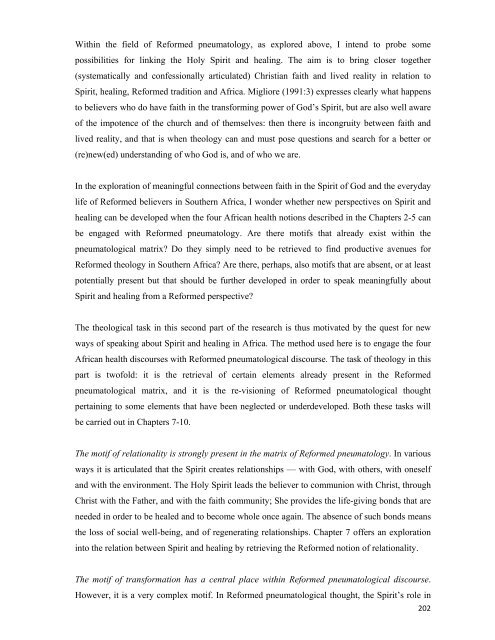spirit and healing in africa - University of the Free State
spirit and healing in africa - University of the Free State
spirit and healing in africa - University of the Free State
Create successful ePaper yourself
Turn your PDF publications into a flip-book with our unique Google optimized e-Paper software.
With<strong>in</strong> <strong>the</strong> field <strong>of</strong> Reformed pneumatology, as explored above, I <strong>in</strong>tend to probe some<br />
possibilities for l<strong>in</strong>k<strong>in</strong>g <strong>the</strong> Holy Spirit <strong>and</strong> <strong>heal<strong>in</strong>g</strong>. The aim is to br<strong>in</strong>g closer toge<strong>the</strong>r<br />
(systematically <strong>and</strong> confessionally articulated) Christian faith <strong>and</strong> lived reality <strong>in</strong> relation to<br />
Spirit, <strong>heal<strong>in</strong>g</strong>, Reformed tradition <strong>and</strong> Africa. Migliore (1991:3) expresses clearly what happens<br />
to believers who do have faith <strong>in</strong> <strong>the</strong> transform<strong>in</strong>g power <strong>of</strong> God’s Spirit, but are also well aware<br />
<strong>of</strong> <strong>the</strong> impotence <strong>of</strong> <strong>the</strong> church <strong>and</strong> <strong>of</strong> <strong>the</strong>mselves: <strong>the</strong>n <strong>the</strong>re is <strong>in</strong>congruity between faith <strong>and</strong><br />
lived reality, <strong>and</strong> that is when <strong>the</strong>ology can <strong>and</strong> must pose questions <strong>and</strong> search for a better or<br />
(re)new(ed) underst<strong>and</strong><strong>in</strong>g <strong>of</strong> who God is, <strong>and</strong> <strong>of</strong> who we are.<br />
In <strong>the</strong> exploration <strong>of</strong> mean<strong>in</strong>gful connections between faith <strong>in</strong> <strong>the</strong> Spirit <strong>of</strong> God <strong>and</strong> <strong>the</strong> everyday<br />
life <strong>of</strong> Reformed believers <strong>in</strong> Sou<strong>the</strong>rn Africa, I wonder whe<strong>the</strong>r new perspectives on Spirit <strong>and</strong><br />
<strong>heal<strong>in</strong>g</strong> can be developed when <strong>the</strong> four African health notions described <strong>in</strong> <strong>the</strong> Chapters 2-5 can<br />
be engaged with Reformed pneumatology. Are <strong>the</strong>re motifs that already exist with<strong>in</strong> <strong>the</strong><br />
pneumatological matrix? Do <strong>the</strong>y simply need to be retrieved to f<strong>in</strong>d productive avenues for<br />
Reformed <strong>the</strong>ology <strong>in</strong> Sou<strong>the</strong>rn Africa? Are <strong>the</strong>re, perhaps, also motifs that are absent, or at least<br />
potentially present but that should be fur<strong>the</strong>r developed <strong>in</strong> order to speak mean<strong>in</strong>gfully about<br />
Spirit <strong>and</strong> <strong>heal<strong>in</strong>g</strong> from a Reformed perspective?<br />
The <strong>the</strong>ological task <strong>in</strong> this second part <strong>of</strong> <strong>the</strong> research is thus motivated by <strong>the</strong> quest for new<br />
ways <strong>of</strong> speak<strong>in</strong>g about Spirit <strong>and</strong> <strong>heal<strong>in</strong>g</strong> <strong>in</strong> Africa. The method used here is to engage <strong>the</strong> four<br />
African health discourses with Reformed pneumatological discourse. The task <strong>of</strong> <strong>the</strong>ology <strong>in</strong> this<br />
part is tw<strong>of</strong>old: it is <strong>the</strong> retrieval <strong>of</strong> certa<strong>in</strong> elements already present <strong>in</strong> <strong>the</strong> Reformed<br />
pneumatological matrix, <strong>and</strong> it is <strong>the</strong> re-vision<strong>in</strong>g <strong>of</strong> Reformed pneumatological thought<br />
perta<strong>in</strong><strong>in</strong>g to some elements that have been neglected or underdeveloped. Both <strong>the</strong>se tasks will<br />
be carried out <strong>in</strong> Chapters 7-10.<br />
The motif <strong>of</strong> relationality is strongly present <strong>in</strong> <strong>the</strong> matrix <strong>of</strong> Reformed pneumatology. In various<br />
ways it is articulated that <strong>the</strong> Spirit creates relationships — with God, with o<strong>the</strong>rs, with oneself<br />
<strong>and</strong> with <strong>the</strong> environment. The Holy Spirit leads <strong>the</strong> believer to communion with Christ, through<br />
Christ with <strong>the</strong> Fa<strong>the</strong>r, <strong>and</strong> with <strong>the</strong> faith community; She provides <strong>the</strong> life-giv<strong>in</strong>g bonds that are<br />
needed <strong>in</strong> order to be healed <strong>and</strong> to become whole once aga<strong>in</strong>. The absence <strong>of</strong> such bonds means<br />
<strong>the</strong> loss <strong>of</strong> social well-be<strong>in</strong>g, <strong>and</strong> <strong>of</strong> regenerat<strong>in</strong>g relationships. Chapter 7 <strong>of</strong>fers an exploration<br />
<strong>in</strong>to <strong>the</strong> relation between Spirit <strong>and</strong> <strong>heal<strong>in</strong>g</strong> by retriev<strong>in</strong>g <strong>the</strong> Reformed notion <strong>of</strong> relationality.<br />
The motif <strong>of</strong> transformation has a central place with<strong>in</strong> Reformed pneumatological discourse.<br />
However, it is a very complex motif. In Reformed pneumatological thought, <strong>the</strong> Spirit’s role <strong>in</strong><br />
202
















